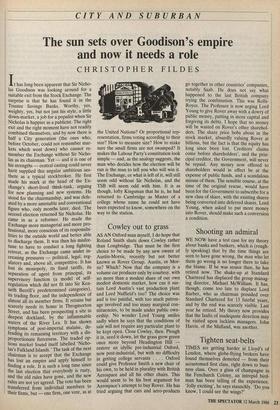CITY AND SUBURBAN
The sun sets over Goodison's empire and now it needs a role
CHRISTOPHER FILDES
It has long been apparent that Sir Nicho- las Goodison was looking around for a suitable exit from the Stock Exchange. The surprise is that he has found it in the Trustee Savings Banks. Worthy, yes, weighty, yes, but not just his style, a little down-market, a job for a populist when Sir Nicholas is happier as a publicist. The right exit and the right moment have not readily combined themselves, and by now there is half a City generation (the ones who, before October, could not remember mar- kets which went down) who cannot re- member the Exchange without Sir Nicho- las as its chairman. Yet — and it is one of his strengths — central casting could never have supplied this angular ambitious aes- thete as a typical stockbroker. He first made his mark at the head of the Ex- change's short-lived think-tank, arguing for new planning and new systems. He stood for the chairmanship, and was defe- ated by a more amenable and conventional figure who, only months later, died. The second election returned Sir Nicholas. He came in as a reformer. He made the Exchange more managerial and more pro- fessional, more conscious of its responsibi- lities to the outside world and better able to discharge them. It was then his misfor- tune to have to conduct a long fighting retreat, as the Exchange came under in- creasing pressures — political, legal, reg- ulatory and, above all, competitive. It has lost its monopoly, its fixed tariffs, its separation of agent from principal, its supervisory function (a model of self- regulation which did not fit into Sir Ken- neth Berri11's predetermined categories), its trading floor, and the independence of almost all its member firms. It retains but scarcely needs its home in Throgmorton Street, and has been prospecting a site in deepest dockland, by the inflammable waters of the River Lea. It has shown symptoms of post-imperial malaise, de- fending its remaining territory with a dis- proportionate fierceness. The traded op- tions market found itself labelled 'Nicho- las's Falkland Islands.' The task of the next chairman is to accept that the Exchange has lost an empire and apply himself to finding a role. It is such a long time since the last election that everybody is rusty, and the old rules have gone, and the new rules are not yet agreed. The vote has been transferred from individual members to their firms, but — one firm, one vote, as at the United Nations? Or proportional rep- resentation, firms voting according to their size? How to measure size? How to make sure the small firms are not swamped? It makes the Labour Party's constitution look simple — and, as the analogy suggests, the man who decides how the election will be run is the man to tell you who will win it. The Exchange, or what is left of it, will still seem odd without Sir Nicholas, and the TSB will seem odd with him. It is as though, lofty Kingsman that he is, he had returned to Cambridge as Master of a college whose name he could not have been expected to know, somewhere on the way to the station.


















































 Previous page
Previous page